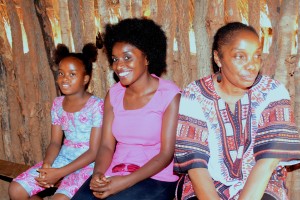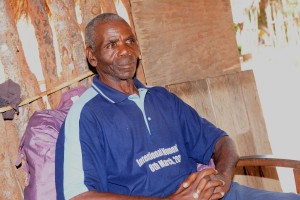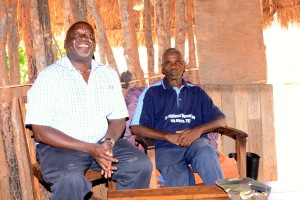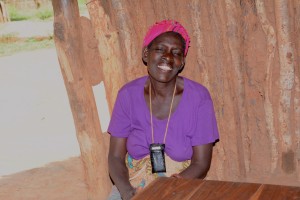by Mwizenge S. Tembo, Ph. D.
Professor of Sociology
Introduction
I was triumphantly standing on a hill overlooking one of the many breathtaking beautiful valleys in Zambia particularly during the rainy season of December. I was not alone. I was standing before the beautiful scene with two other intellectuals; Marita Banda, Mulenga Kapwepwe, and an eight year old girl Temwani Banda who was Marita Banda’s niece. What were we doing here in the wilderness away from the hustle and bustle of the Capital City of Lusaka with its nonstop action everywhere you go? This was the beginning of the culmination of the longtime dream I have had over the last 10 or even 30 years to establish a serene location in the Savannah wilderness where Zambians can
contemplate knowledge. We were scouting for a location of The Kukaya-Kufwasa Center for Contemplation of Knowledge near the Chongwe area along the Great East Road. If you have not yet done so read part one of this story to understand the background to this article.
Woman Breaks Intense Discourse
Mulenga Kapwepwe, Marita Banda, Temwani Banda and I were standing in a circle deeply engaged in an intense discourse of intellectual ideas in the middle of the Savannah grassy wilderness on top of a hill. We discoursed about gender in traditional Zambia and contemporary Western distortion of the status of Zambian women. I elaborated on the Zambian Temba Sangweni philosophical thesis about how the womb may influence human thought process in psychology. Idea after idea kept coming. We were so focused and engrossed that we lost track of time and where we were standing. At one time I remember in the periphery of my consciousness of my eye being aware of a boy walk by with a herd of cows. Suddenly a slender woman perhaps in her fifties approached us and paused about 20 meters or 20 yards from where the four of us were standing.
We instantly stopped as if coming out of a dream. The woman politely greeted us in somewhat very halty broken Nyanja. We responded.
“Banthu wadabwa kuti nibandani yayimira apa na motoka panthawi yotali?” she asked. (People in the village have been wondering what strangers standing around in the bush with a vehicle were doing?)
Strangers Standing in the Bush
That’s when it suddenly hit me. I have lived in the village since the 1950s and conducted research in rural villages in Eastern and Southern Province for many years. The first cardinal rule of protocol if you go anywhere in a rural area for an extended time, you have to visit and seek permission of the headman. In the midst of the spontaneous philosophical and intellectual discourse, we had lost track of time and became unconscious that were spending too much time just standing in the bush; 1 man, 2 women and a young girl. It doesn’t get and stranger than and as puzzling as this.
I apologized profusely and told her talakwa; twa phwanya mwambo. (We were wrong we had broken custom.) I explained to her that we had seen the beautiful valley and the hills from near Chongwe on the Great East Road. We wanted to see how the valley looked like from here on this side. I assured her that our stay was peaceful. As a matter of courtesy I offered that we pay a visit to the village headman. The woman entered the vehicle and we drove to the village to meet the headman.
We Meet the Headman
We entered the mphungu; which is a small round structure with a grass roof but with open sides. We sat down until the Headman who had been summoned arrived. He sat down, greeted us in a mixture of Lenje and Lusaka Nyanja languages. He told us he was Headman Ngobola. He told us his village is in Chief Bundaunda which is between Chieftainess Nkomeshya and Mphashya further East in Rufunsa region.
One Zambia One Nation
We told Headman Ngobela that the land was beautiful and that the woman who had met us was very friendly since we had not consulted him first. He said the land we had been standing on belongs to a Tumbuka man. He also said there were 2 Bemba men who had settled in the area. I told him that in my home village in Lundazi, there was a Tonga man who had married and had settled. He was speaking Tonga with Tumbuka accent. We all laughed. This is when Headman said something that was very profound. It makes me and should make every Zambian feel very proud and lucky to be a Zambian. Referring to people from various tribes who have settled in his area; Headman Ngobela said in his painful mixture of the Lenje and Lusaka Nyanja language:
“Mlemdo abwera ni katemo kakuthwa. Tizinkhala wa mtendere. Kaunda anatigwirisa One Zambia One Nation.” (A visitor sometime comes with a sharp axe. We should live in peace. President Kaunda united us Zambians under One Zambia One Nation”. At the end of our visit, we were given some very delicious bagful of mangoes.
Conclusion
Our trip had been more than successful. We learned by accident what the Kukaya_kufwasa Center for Contemplation of Knowledge will do in being a hosting place for intellectual and philosophical ideas. The fact that all the villages had a strict accounting of who steps on their land created the traditional security which is the comfort and security of all village life in Zambia. Although we had been only scouting and not yet chosen where the center may be located, this was a very good start.
References
- Bohannan, Paul., and Curtin, Philip, Africa and Africans, 4th edition, Prospect Heights, Illinois: Waveland Press, 1995.
- Kufwasa http://people.bridgewater.edu/~mtembo/menu/articles/kufwasa.shtml
- Kukaya https://hungerforculture.com/?p=1537
- https://hungerforculture.com/?p=1212



